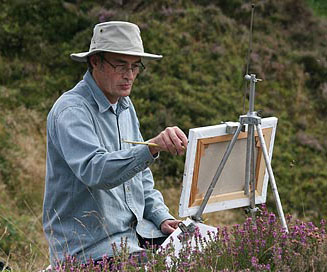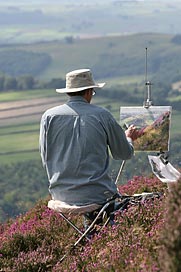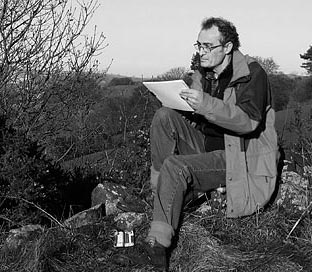Rex Preston was born in Yardley, Birmingham in 1948, but lived in various places around the Midlands until his family settled in Derbyshire when he was 16. He trained at Newcastle under Lyme School of Art and then Derby College of Art. This early training in life drawing and perspective has proved invaluable to him. After college, Rex initially worked as a print designer at Bemrose Printers in Derby, but never stopped painting in whatever spare time was available and soon began to sell several of his paintings. At the age of 21 he resigned from his job to concentrate on painting full time; a decision he has never regretted.

In his early years as an artist, he painted a variety of subjects, but his interest in the countryside naturally led him towards landscape painting. The development of his style was never a conscious decision, it just evolved over the years, but living by a river in a beautiful part of Derbyshire certainly had a huge influence. He was able to experience nature’s changing moods at first hand. “It may have snowed for an hour, but when the sun comes out and begins to melt the snow, everything starts to glisten on the trees, rooftops and rivers. In the evening, the sun sets silhouetting the trees and village church. On waking in the morning, the mist engulfing the whole scene creates a completely different world.” This continuous observation of nature has shaped all of his painting.
Rex Preston gets his inspiration from the landscape and loves to paint everything from the moody, mountainous landscapes of Scotland to the beautiful spring flowers on the cliffs in Cornwall. Each year he goes on many painting trips around the country, either finding new areas to paint or revisiting favourite areas like Cornwall or the Lake District. In recent years Norfolk has been added to his list of favourites. He never accepts commissions, which leaves him free to paint whatever he wants with enthusiasm. He has always had a fascination with the wild, unspoilt moorland areas of the Peak District and his recent book “Rex Preston’s Peak District and Pennines” sold out very quickly.

“I spend as much time as possible out in the countryside whatever the weather searching for subjects, often accompanied by my son Mark, who is also an artist. When the weather allows, I paint out on location and just walk until something takes my eye. I quite often don’t know what I am looking for, but it usually involves colour, light and reflections. Sketching is also very useful to quickly record fleeting light effects and atmospheres. Often in showery weather it would be impossible to paint, but a sketch can record the changing skies and light effects. The most incredible effect might only last for a few minutes, but with my pencil and sketchbook, I can capture enough to be able to paint it later. Back in my studio, my sketch will remind me of what really inspired me and, together with my memory and imagination, will give me all I need to complete the painting.”
Most of Rex’s larger paintings are done from sketches, as they are too big to paint on location, but he surrounds himself in his studio with his plein-air paintings to help with the colour.
Although Rex has painted in watercolour and acrylic, he always returns to oil painting as his preferred medium. He had a long association with Michael Mosley at the Granby Gallery in Bakewell, where there were bi-annual Rex Preston exhibitions for many years. The gallery closed in January 2006, when Michael retired due to ill health and Rex lost a valued friend when he died in May 2006.

In recent years Rex has had a great deal of success with his abstracted landscapes. These more abstract paintings use all the same skills as his more traditional landscapes, but focus on the mood and colour in a subject rather than any detail.
He has enjoyed the challenge of concentrating on a small part of a landscape, for instance painting just the reflections in water; or the sunlight coming through the clouds lighting up a small area of landscape.
Rex has always found painting landscapes exciting, but abstracting the landscape has opened his eyes to endless new possibilities.
